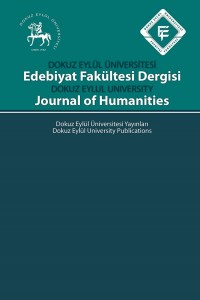Öz
Makalenin temel konusu geç antikite Yunan düşünürlerinden Plotinos’un ruha dair öğretisi içerisinde doğa kavramının spesifik konumu. Makalenin birbirine paralel iki amacı var. Birincisi Plotinos’un doğa kavramını ele alış biçimi ve kullanış şekillerinin kendini önceleyen filozofların detaylı bir yorumu sonrasında nasıl ortaya çıktığını açıklamak. İkincisi ise, ortaya çıkan öğretinin bunun da ötesinde hangi bakımlardan özgün bir niteliğe sahip olduğunu göstermek. Temel olarak Plotinos’un teknik psikoloji yazıları olarak ele alınabilecek Ennead IV 3-4’e odaklanan makale, orijinal eserden alıntılanan çeşitli pasajların birbiriyle ilişkili olarak incelenip yorumlanması yöntemini takip etmekte. Makalenin asli kısmı olan filozofun ruhun çeşitli kısım ya da fazlarına dair görüşleri ve bu fazlar arasında evrendeki doğanın bir uzantısı olarak tekil doğanın yeri konusundan önce, Plotinos’u önceleyen filozoflar Platon ve Aristoteles’in bu konularla ilgili görüşlerine değinilen kısım yer almakta. Yapılan karşılaştırma bize Plotinos’un öncüllerinden aldığı psikolojiye dair kavramları dinamik bir epistemoloji ve etik oluşturmakta nasıl kullandığı ve bu süreçte hem kavramsal hem de yazınsal olarak kendine has ne gibi özellikler ortaya koyduğu olacak.
Anahtar Kelimeler
Kaynakça
- Aristotle. (1894). Ethica Nicomachea, I. Bywater (edit). Oxford: Oxford University Press.
- Aristotle. (1957). Metaphysica. W. Jaeger (edit.). Oxford: Clarendon Press.
- Aristotle. (1963). De Anima. W.D. Ross (edit). Oxford: Oxford University Press.
- Bowe, G.S. (2003). Plotinus and the Platonic Metaphysical Hierarchy. New York: Global Scholarly Publications.
- Brickhouse, T. ve Smith, N. (1994). Plato’s Socrates. Oxford: Oxford University Press.
- Carone, G. R. (2001). Akrasia in the Republic: Does Plato Change His Mind? Oxford Studies in Ancient Philosophy Vol. XX: 107-149.
- Cooper, J. M. (1999). Reason and Emotion: Essays on Ancient Moral Psychology and Ethical Theory. Princeton: Princeton University Press.
- Emilsson, E.K. (1998). Plotinus on the Emotions. Juha Sihlova ve Troels Engberg-Pedersen (edler). The Emotions in Hellenistic Philosophy: İçinde 339-363. Dordrecht: Springer-Science+Business Media, B.V.
- Frede, M. (1992). Introduction. S. Lombardo and K. Bell (çev.). Plato: Protagoras. Indianapolis: Hackett Publishing Company. Gill, C. (2006). The Structured Self in Hellenistic and Roman Thought. New York: Oxford University Press.
- Irwin, T. (1995). Plato’s Ethics. Oxford: Oxford University Press.
- Kahn, C. (1996). Plato and the Socratic Dialogue. Cambridge: Cambridge University Press.
- Kalligas, P. (2014). The Enneads of Plotinus. A Commentary. Volume 1. Elizabeth Key Fowden – Nicolas Pilavachi (çev.). Princeton and Oxford: Princeton University Press.
- Karfik, F. (2014). Parts of the Soul in Plotinus. K. Corcilius ve D. Perler (edler). Partitioning the Soul. Debates from Plato to Leibniz: İçinde 107¬¬¬–48. Berlin/Boston: Walter de Gruyter.
- Moline, J. (1981). Plato’s Theory of Understanding. Wisconsin: The University of Wisconsin Press.
- Noble, C.I. (2013). How Plotinus’ Soul Animates his Body: The Argument for the Soul-Trace at Ennead 4.4.18.1-9. Phronesis 58: 249-249.
- O’Meara, D. (1993). Plotinus: An Introduction to the Enneads. Oxford: Oxford University Press.
- Plato. (1903a). Protagoras. John Burnet (edit.) Platonis Opera içinde. Oxford: Oxford University Press.
- Plato. (1903b). Republic. John Burnet (edit.) Platonis Opera içinde. Oxford: Oxford University Press.
- Plotinus. (1983). Plotini Opera (Editio minor). P. Henry, H.R. Schwyzer (edit.). Oxford: Clarendon Press. [Enn.]
- Rowe, C. (2007). Plato and the Art of Philosophical Writing. Cambridge: Cambridge University Press.
- Vlastos, G. Socrates. Proceedings of the British Academy 74: 89-111.
Öz
Kaynakça
- Aristotle. (1894). Ethica Nicomachea, I. Bywater (edit). Oxford: Oxford University Press.
- Aristotle. (1957). Metaphysica. W. Jaeger (edit.). Oxford: Clarendon Press.
- Aristotle. (1963). De Anima. W.D. Ross (edit). Oxford: Oxford University Press.
- Bowe, G.S. (2003). Plotinus and the Platonic Metaphysical Hierarchy. New York: Global Scholarly Publications.
- Brickhouse, T. ve Smith, N. (1994). Plato’s Socrates. Oxford: Oxford University Press.
- Carone, G. R. (2001). Akrasia in the Republic: Does Plato Change His Mind? Oxford Studies in Ancient Philosophy Vol. XX: 107-149.
- Cooper, J. M. (1999). Reason and Emotion: Essays on Ancient Moral Psychology and Ethical Theory. Princeton: Princeton University Press.
- Emilsson, E.K. (1998). Plotinus on the Emotions. Juha Sihlova ve Troels Engberg-Pedersen (edler). The Emotions in Hellenistic Philosophy: İçinde 339-363. Dordrecht: Springer-Science+Business Media, B.V.
- Frede, M. (1992). Introduction. S. Lombardo and K. Bell (çev.). Plato: Protagoras. Indianapolis: Hackett Publishing Company. Gill, C. (2006). The Structured Self in Hellenistic and Roman Thought. New York: Oxford University Press.
- Irwin, T. (1995). Plato’s Ethics. Oxford: Oxford University Press.
- Kahn, C. (1996). Plato and the Socratic Dialogue. Cambridge: Cambridge University Press.
- Kalligas, P. (2014). The Enneads of Plotinus. A Commentary. Volume 1. Elizabeth Key Fowden – Nicolas Pilavachi (çev.). Princeton and Oxford: Princeton University Press.
- Karfik, F. (2014). Parts of the Soul in Plotinus. K. Corcilius ve D. Perler (edler). Partitioning the Soul. Debates from Plato to Leibniz: İçinde 107¬¬¬–48. Berlin/Boston: Walter de Gruyter.
- Moline, J. (1981). Plato’s Theory of Understanding. Wisconsin: The University of Wisconsin Press.
- Noble, C.I. (2013). How Plotinus’ Soul Animates his Body: The Argument for the Soul-Trace at Ennead 4.4.18.1-9. Phronesis 58: 249-249.
- O’Meara, D. (1993). Plotinus: An Introduction to the Enneads. Oxford: Oxford University Press.
- Plato. (1903a). Protagoras. John Burnet (edit.) Platonis Opera içinde. Oxford: Oxford University Press.
- Plato. (1903b). Republic. John Burnet (edit.) Platonis Opera içinde. Oxford: Oxford University Press.
- Plotinus. (1983). Plotini Opera (Editio minor). P. Henry, H.R. Schwyzer (edit.). Oxford: Clarendon Press. [Enn.]
- Rowe, C. (2007). Plato and the Art of Philosophical Writing. Cambridge: Cambridge University Press.
- Vlastos, G. Socrates. Proceedings of the British Academy 74: 89-111.
Ayrıntılar
| Birincil Dil | Türkçe |
|---|---|
| Bölüm | Makaleler |
| Yazarlar | |
| Yayımlanma Tarihi | 29 Nisan 2020 |
| Gönderilme Tarihi | 27 Kasım 2019 |
| Yayımlandığı Sayı | Yıl 2020 Cilt: 7 Sayı: 1 |


